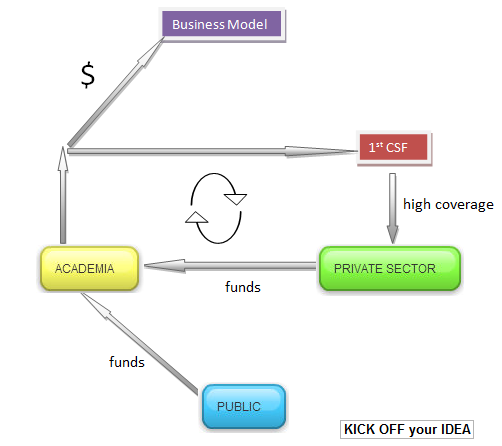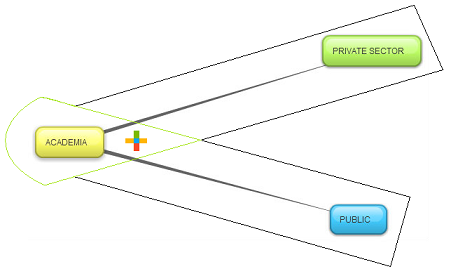Kick off Your Idea
Overview
Category: Education
Event: Global Social Business Competition 2013
Rank: Finalist
Team: Marek Zamecnik, Milos Boska
Project Status

Annually, around 10,000 Slovak people with higher education degrees go abroad in order to find better opportunities. This is more than a quarter of those who every year obtain a diploma from universities in Slovakia. Also, according to Academic Ranking of World Universities 2012, Slovakia has no presence in the top 500 of world universities. Another issue is the lack of interaction between the private sector and academia in Slovakia. The research coming from academia is at an extremely low number compared to other EU countries.
We believe that there is a strong connection between these facts. Slovak talented students often take their ideas to places where they are able to capitalize them. We feel that Slovak education system does not sufficiently provide students with necessary resources for such ideas or projects.
We would like to stop this brain drain from Slovakia and offer the students a place and means through which they would be able to put their ideas and projects to reality. Also to create more interaction between private sector and academia along with motivating the private sector to fund projects from universities.
We also believe that there are other European countries that are struggling with the same problem. After piloting this project in Slovakia we would like to spread this project to countries such as Bulgaria, Latvia or Ukraine.
We would like to create a crowdfunding platform for students from universities and high schools in Slovakia. This platform would provide them with an ultimate place for presenting, funding or developing their interesting projects. We want to give them a chance to use their potential the best they can.
Moreover, this platform would connect schools with people that could be interested in funding projects such as students, alumni, parents and on the other side companies. The platform would also provide a solution for companies how to promote their brand name to the society as being socially responsible corporations by funding the projects.
Also, thanks to this platform students would be able to find financial resources for facilities (tools and items for educational purposes) that are needed for modern education of the 21st century. Students and schools could find funds for anything related to education, innovation, creativity and social cause.
By improving the educational facilities in Slovakia and connecting the private sector with academia (hence, more possible research for universities), we believe that it could improve the overall standings as well.
We would like to create a crowdfunding platform for students from universities and high schools in Slovakia. This platform would provide them with an ultimate place for presenting, funding or developing their interesting projects. We want to give them a chance to use their potential the best they can.
Moreover, this platform would connect schools with people that could be interested in funding projects such as students, alumni, parents and on the other side companies. The platform would also provide a solution for companies how to promote their brand name to the society as being socially responsible corporations by funding the projects.
Also, thanks to this platform students would be able to find financial resources for facilities (tools and items for educational purposes) that are needed for modern education of the 21st century. Students and schools could find funds for anything related to education, innovation, creativity and social cause.
By improving the educational facilities in Slovakia and connecting the private sector with academia (hence, more possible research for universities), we believe that it could improve the overall standings as well.
We believe that our project would create social impact in the education system and would also create the opportunity for creating jobs. Namely, the social impact would be:
- Improving educational environment
- Connecting private sector with academia
- Creating jobs for students and unemployed people
- Letting the students to be ‘free’, giving them the opportunity to rely on their own skills and abilities.
- A place for communication between public, academia, and private sector
How do we measure? – by the number of successfully accomplished projects, by the number of companies actively involved, positive/negative feedback from the society
We aim to have two sources from which the finance will flow to the business model. The first source of finance is from school projects and the second source is from advertisements. Also, we need to identify our critical success factor (CSF) that will make it all possible.
CSF - high number of visitors on our website, good reputation, media coverage, general positive awareness of our project between people.
1. Inflow of finance from school projects
We divided our customers into 3 groups. Now we want to question what would make companies to fund projects and what would make students to create them.
- Private sector group
For instance company X funds a project in a school for buying white boards. We then create an article about the project. We will show how company X contributed into this project and what are the tangible results (short video & pictures). Companies would have their profiles with information about the projects they funded. If we manage to satisfy our CSF, companies would be motivated to fund such projects as this is an effective way how to present themselves (CSR) to the society. Secondly, we believe that the private sector will have a generic business interest into supporting such projects as it is also in their interest to keep the talent in Slovakia.
- Academia group
Once students will be aware that companies are interested in funding, this would motivate them to create the projects. Furthermore, we will create an internal social network on the platform for schools. This helps to connect people (students, parents, alumni) who could be interested in projects coming from a particular school. To foster creativity and a number of projects for the platform we will create a ‘creative thinking unit (CTU)’. This unit would work with schools and students. CTU would organise lectures and workshops. At the workshops students would create projects with our help.
After this, the two major groups (education, private sector) are satisfied and this already creates a relatively sustainable circle. However the CSF is crucial to this all. Further down, the business model is explained also numerically.
2. Flow of finance from advertising
Firstly, we want to have 2 AD panels on the website if CSF is satisfied, bearing in mind trying not to disturb the main focus of our web. Secondly, we want to have around 11 projects on the top of the website that could be promoted for a certain time by the creators in order to attract more funders.
In numbers
Student & teacher projects – we take a fee of 4.9% from a project if it succeeds to collect the amount, 7.9% if they do not. This is simply to motivate ‘creators’ to set a reasonable amount they want to collect.
Fundraising for school facilities & social cause– we charge 1.9% as a fee from the amount. We want to develop the educational facilities and this is one of our largest benefits. If they do not reach their goal the fee is to be at 2.9%.
Who can create
- students, schools (teachers, professors, and schools), anyone with a project related to the theme
Who can fund
- public (basically everybody), private sector
Tab Content goes here
We decided to divide our potential customers into 3 groups – Academia (people related to universities and high schools), Private Sector, and Public. Our platform will connect all the 3 groups via Academia. Private sector is interested in presenting/marketing their companies to public and in finding talented students. Academia is interested in finding funds and job opportunities. Public is interested in better Slovakia.
Academia benefits
Funds for projects – from public and private sector
Job opportunities
Feedback (from the 3 groups) for projects
Support from KICK OFF your IDEA
Research opportunities from private sector
Private Sector benefits
Head hunting – platform will have a database of students
Possible crowdsourcing from students
Corporate Social Responsibility – by funding the projects companies can present themselves to the society as being socially responsible
Company marketing
Public benefits
Transparency – public will see how the projects are funded, where the money goes etc. This will be supported with short videos and reports about the projects
Non-gov influence
Mutual benefits
Communication – fostering communication between private sector, public, and academia
Inspiration – platform will be a source for further inspiration
Better Slovakia – all the 3 groups will contribute to better Slovakia
Direct
We believe that such platform (education sector oriented), as we present it, is not yet there on the market. Therefore we believe that there is not too much (possibly none) direct competition. However, we found several types of indirect competition which can indirectly impact our social business.
Indirect
- Other crowdfunding platforms such as dobrakrajina.sk, rozbehnito.sk or ludialudom.sk. (however they focus on other issues such as people in social need not education particularly and work as charities)
- Private funding organisations that offer their capital to fund projects. (however this on one-on-onebasis)
Strengths – original project of its kind, trying to tackle a great national discontent with the education sector, relatively low initial investment, first mover advantage
Weaknesses – society’s wrong perception on the project,
Opportunities – job creation, limitless number of project ideas, further project development to other problematic sectors such as health care, opportunity to go to other countries with similar issues of education system, providing other related services on the platform such as offering the private sector to do crowdsourcing from the potential talent, startup accelerator, platform for investors,
Threats – really depended on the CSF, misunderstanding of the project by the society, private sector does not contribute to this project



